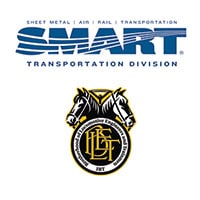
The SMART Transportation Division (SMART-TD), Brotherhood of Locomotive Engineers and Trainmen (BLET) and the Academy of Rail Labor Attorneys (ARLA) have filed a joint motion and brief urging the United States Supreme Court to prevent railroads from seeking property damages from their employees who are involved in railroad accidents.
The joint amicus curiae brief was filed in the case of Melvin Ammons and Darrin Riley v. Wisconsin Central, Ltd. Following a 2014 derailment, Conductor Ammons and engineer Riley filed suit under the Federal Employers’ Liability Act (FELA), claiming the carrier had failed to provide a safe place to work resulting in injuries to them. In its counter claim, Wisconsin Central blamed Ammons and Riley for causing the accident. The carrier further argued that the crew acted in a negligent manner and sought damages from the employees in excess of $1 million for damage to railroad property.
In their brief, SMART-TD, BLET and ARLA argue that to allow a railroad to recover property damages from employees following an accident is an unlawful device that permits the railroad to evade its own legal liability, and will create a potential catastrophe in the railroad industry because the safety-reinforcing purpose of FELA will be destroyed.
“No tactic by the railroads has more potential for destroying employees’ rights — the exclusive remedial recourse available to railroad employees — under the Federal Employers’ Liability Act (‘FELA’ or the ‘Act’) than allowing a railroad to seek property damages from an employee arising out of an accident,” the group wrote in its amicus brief.
Congress created the FELA in 1908 with the “twin objectives of providing effective relief to railroad workers injured or killed because of their employer’s negligence and giving railroads an economic incentive to improve the safety of this nation’s railroads.” This remedial purpose was underscored by amendments to the Act in 1908 and numerous times thereafter.
The FELA prohibits a railroad from utilizing “any device whatsoever” to exempt itself from liability. SMART-TD, BLET and ARLA contend that seeking property damage from employees in the event of accidents is such a device, and one that would basically exempt railroads from liability.
It was explained to the Supreme Court that “[i]t was not the intention of Congress in enacting FELA, with the inclusion of ‘any device whatsoever,’ that by the device of a claim for property damages, a railroad may avoid financial liability for its negligence, collect damages from an employee or drive an employee to bankruptcy, and whether it be the collection of damages or employee bankruptcy, dissuade other employees from filing FELA claims.”
SMART-TD, BLET and ARLA also argue that allowing employees to be sued for property damages would jeopardize safety in the railroad industry and discourage future safety improvements. In its brief, the group wrote: “Congress’ purpose in enacting FELA was to shift the cost of the ‘human overhead’ of railroading from the injured employees to their railroad employers. Allowing railroads to offset their FELA liability by shifting these losses back to the employees through property damage claims frustrates that Congressional design and jeopardizes the safety of the nation’s rail system.”
A copy of the amicus brief can be found here (PDF).
Related News
- New CSX conductor improvises to save a life
- SMART News: Protecting Railroad Retirees’ Future
- More Than a Story: SMART-TD’s Women’s History Month Highlights Legacies in the Making
- Tentative Agreement Reached in Boston
- Nevada railroaders: ACT NOW to help pass a railroad safety bill
- Legislative win means more money for disabled rail workers in New Jersey
- Catching Flies with Honey: Jessica Martin Builds Solidarity on the Local Level
- Historic short-line agreement proves workers are stronger with SMART-TD at their side
- Organizers Use Broad Skill Set to Increase Membership
- Martha Claugus Marks Three Decades with Alaska Railroad